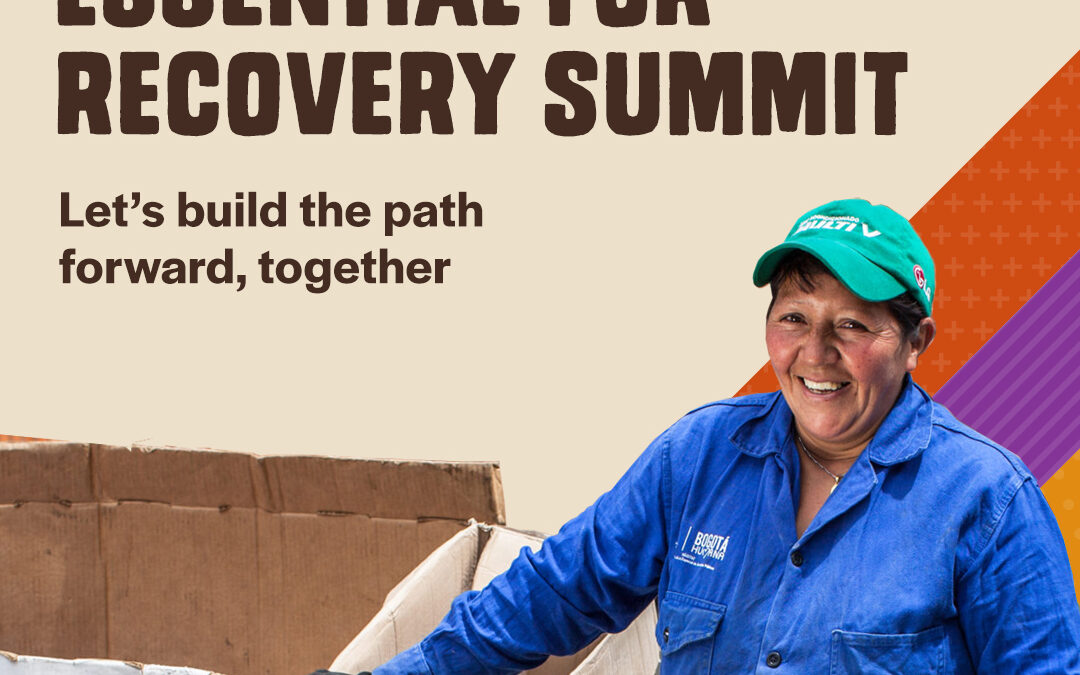
Sep 14, 2021
Workers who risked their health to provide essential services during the pandemic joined with actors, global union leaders and policymakers in a first-of-its-kind worldwide gathering to share their experiences and demand a response that urgently and effectively protects all people, and especially the most marginalized.

Yalitza Aparicio spoke in support of government action to ensure essential workers have decent wages and safe work.
“COVID-19 has taught us about the importance of workers in all sectors and recognize that they deserve dignified work and they are important in the world economy,” said actor Yalitza Aparicio. “Governments know about this. But, what are they doing about it?” Aparicio was among dozens of speakers during the September 8–10 Essential For Recovery virtual summit who pointed to the need for action to ensure decent wages, rights and social protections like paid sick leave so workers deemed “essential” during the pandemic will not be left behind after the crisis passes.
As the Summit made clear, essential workers often work in the informal economy. “They have no rights, no minimum wages, no rule of law, no social protection,” said Sharan Burrow, general secretary of the International Trade Union Confederation (ITUC). “We have to get a minimum living wage to all essential workers. We have to afford them collective bargaining rights. And we have to put in place universal social protection in safe workplaces.”
Organized by the Open Society Foundations and hosted by actor Sophia Bush, Essential For Recovery focused on four themes: increased income and improved working conditions; healthy and safe workplaces and access to health care; social protection benefits and support for vulnerable workers; and ending gender-based violence and harassment at work.
The Solidarity Center co-sponsored the event, along with HomeNet International, ITUC, StreetNet International Alliance of Street Vendors, UNI Global union and WIEGO.
Catch the full three one-hour sessions:
Unions, Collective Action Key to Building Back Better
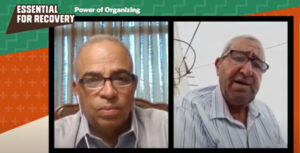
Mithqal Zinati (right), a coordinator for Jordan’s agricultural sector, says workers need the right to form unions to ensure safe workplaces.
In Jordan, where workers have limited rights to form unions, Mithqal Zinati, a coordinator for the country’s agricultural sector, says the government’s action “keeps thousands and tens of thousands of workers from being part of providing solutions to the problems facing the agriculture sector. This eliminates the role of workers to defend their rights and protect their interests and to see beneficial gains.
“For everyone, having a union is very beneficial. For farmers and for workers at the same time.”
As the pandemic highlighted, workers with unions often more readily had access to personal protective equipment (PPE) and decent wages. Summit participants discussed the power of grassroots organizing to improve workers’ lives, and described how, over the last year, essential workers in the formal and informal economies went on strike to win access to PPE and vaccines. They took to the streets and to social media to demand more democratic societies and governments.
Maria do Carmo, a Brazilian street vendor, organized street vendors into a nationwide organization, the National Union of Hawkers, Street and Market Vendor Workers of Brazil (UNICAB), and through their collective power, raised awareness of their issues with politicians. “Today we have respect from City Hall,” she said.
“Over the past two days, we’ve seen proof of the effectiveness of collective action, and of the importance of eliminating gender inequities. But at the heart of it all is power,” said Bush, at the start of the third and final session.
Women Targets of Gender-Based Violence, Burdened with Carework
The pandemic also forced many to work from home where women disproportionately engaged in care work. Globally, women lost $800 billion in income due to COVID-19.
Mercedes D’Alessandro, the first national director of Economy, Equality and Gender in Argentina, described a study in which she found that during the pandemic, three-quarters of women did unpaid care work, amounting to 22 percent of GDP—up from 16 percent of GDP before COVID-19.
“The truth is that the increase in time that women dedicate to care activities means also a smaller opportunity to go out and look for a job, continue with their jobs, develop their careers or study, graduate from university,” she said.

Shirley Pryce, president of the Jamaica Household Workers Union, urges governments to ratify a treaty ending gender-based violence at work.
Women also experienced high levels of violence during lockdowns, further highlighting the need for governments to ratify an International Labor Organization (ILO) treaty (Convention 190) to end gender-based violence at work.
“Violence and harassment can happen anywhere, and it can happen to anyone,” said Shirley Pryce, president of the Jamaica Household Workers Union. “But this must not be tolerated. It must stop. Let us push together for governments to ratify this very important convention.”
C190 covers wherever work is performed, such as where workers take a rest break or meal or use sanitary, washing or changing facilities, and includes commuting to and from work.
“We are seeing a new normal. Home has become a workplace,” said Rose Omamo, general secretary of the Amalgamated Union of Kenya Metal Workers, a Solidarity Center partner. Employers must ensure workers have what they need to work from home, including safe workplaces, she said.
Building to a Better, More Equitable Tomorrow

Artists like Sinkane performed during the Essential Worker Summit.
Omamo was in conversation with Rosa Pavanelli, general secretary of Public Services International. The summit provided opportunities for shared discussion, “lightening rounds” featuring workers telling their stories and urging action, and videos showcasing worker issues such as the Tunisian General Labor Union (UGTT)’s documentary on women agricultural workers seeking safer transportation.
Essential for Recovery also featured multimedia presentations by performance artists such as Khansa, a singer, songwriter and dancer from Lebanon; U.S. actor Martin Sheen; Sonam Kalra of the Sufi Gospel Project; and Ahmed Abdullahi Gallab Sinkane, a Sudanese-American musician.
“I stand with all essential workers around the globe. The domestic and agricultural workers, waste pickers, street vendors, caregivers and home-based workers who make our world run,” said Sinkane, before performing U’Huh.
“During the pandemic, we saw how essential they really are. They deserve a living wage, proper employment conditions and a safe and healthy workplace,” he said. “Let’s build forward to a better, more equitable tomorrow.”
Key participants in Essential For Recovery also included Christy Hoffman, UNI Global Union general secretary; Maina Kiai, former United Nations Special Rapporteur on the rights to freedom of peaceful assembly and of association; Guy Ryder, ILO director general and Ai-jen Poo, National Domestic Workers Alliance executive director.
Sep 7, 2021
Some 70 Bolt food delivery drivers in Ukraine are waging a digital strike after their wages were reduced by 50 percent, a move that built on the drivers’ discontent with lack of health coverage and cutbacks in bonus payments, a growing global phenomenon. The platform workers are turning off their apps each day at 2 p.m., making it difficult for the company to fulfill evening food orders.
“Transportation costs are the same, risks are the same, and money is half as much. It’s outrageous!” says Artem, a Bolt courier. Like many striking couriers, his backpack features a sticker supporting the strike.
Further cutting into drivers’ wages, he says, is the need to pay for constant bike or scooter repairs.
“For seven days of eight to ten hours of work, a courier covers more than 1,000 kilometers (622 miles) amid city traffic. Every day, you face potholes on the road, there is a constant need of repair, replacing some parts,” he says. “Income no longer covers risks.”
Bolt Founder a Billionaire, Workers Struggle for Pay
Although Bolt is a familiar brand in the United States for its green ride-sharing scooters scattered across urban areas, elsewhere in the world, the company rivals Uber as a delivery service, with 75 million customers in Africa and Europe, especially eastern Europe. In Ukraine, Bolt has 3.5 million customers served by fewer than 100 delivery drivers.
The company is valued at more than $2 billion, according to its Estonian founder Markus Willig, and raised $20 million in funding from the World Bank’s International Finance Corporation this year. With total fundraising at $596 million, the company seeks to expand further into Africa and plans to add markets in Latin America and Asia Pacific through franchising agreements.
Yet, even as Willig, 27, has become the third richest person in Estonia through Bolt profits, couriers who daily face dangerous conditions receive no income when they are injured and cannot work.
“You constantly hear about couriers getting into an accident, receiving medical treatment, having surgery,” says Artem. “If you suffer yourself, there must be a certain ‘cushion’ for you not to starve at least for the duration of treatment.”
Bolt workers in Ukraine are calling for a return to the previous bonus and payment structure, and pay for waiting at restaurants for orders. They also want health and life insurance and say the company should seek legislative measures to ensure scooters are registered.
Platform Workers Join Together to Demand Rights
Well before the COVID-19 pandemic boosted home delivery services, the demand for couriers and other essential workers was increasing around the world. But because they are classified as “independent contractors,” platform workers are ineligible for the same benefits as workers in the formal economy, and typically are not covered by a country’s labor laws.
Like Bolt workers in Ukraine, couriers from Nigeria to Colombia are joining together to demand their fundamental rights to decent work—living wages, social protections like health care, and measures to improve job safety.
Workers at Bolt’s Ukraine rival, the Spanish-owned Glovo, pushed for an increase in wages and paid insurance, revealing brutal working conditions in the process. Across Ukraine, unions are engaged in creative campaigns to reach gig economy workers, a campaign worker rights attorney George Sandul discusses in depth on The Solidarity Center Podcast.
In Colombia, Rappi platform delivery workers last year formed the Union of Platform Workers (UNIDAPP), to counter fluctuating pay rates for individual delivery jobs, unexplained fines levied by the company, and the arbitrary barring of workers from the platform to accept jobs.
Bolt workers in other countries are taking action as well. Earlier this year, the Independent Workers’ Union of Great Britain protested lack of safety for drivers following the murder of Bolt driver Gabriel Bringye. Research published by Oxford University in March found that Bolt and Amazon had the worst working conditions for gig economy workers in the UK.
In Tbilisi, Georgia, couriers at Bolt went on strike in March to protest lowered wages and what they say is a manipulated bonus system and unwarranted layoffs. Georgia couriers at Glovo also protested this past spring over lack of medical coverage for work-related injuries and changes to the app-based algorithm making it more difficult to get orders..
Bolt drivers in Lagos, Nigeria, part of the Professional E-hailing Drivers and Private Owners Association, went on strike in April to protest poor working conditions and pay. Bolt recently was forced to increase fares in Kenya after drivers in Nairobi threatened to strike over high fuel prices.
As Artem says, “We have to remind them that in a food delivery company, couriers are the ones who actually deliver, and without them the company does not exist.”
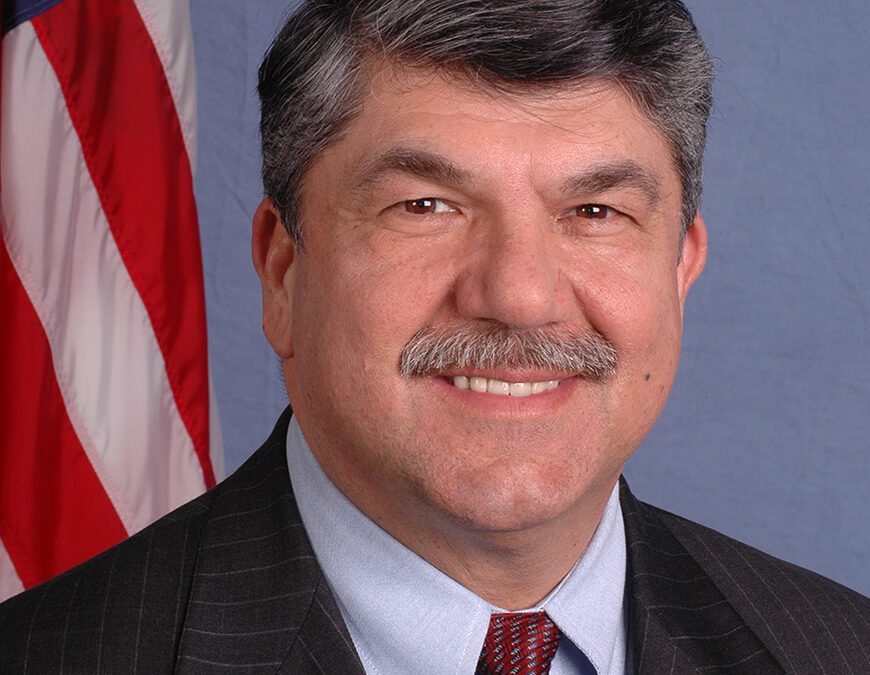
Aug 6, 2021
AFL-CIO President Richard Trumka, son of a U.S. coal miner and leader of the largest and most powerful organization of working people in the United States, believed strongly in the strength of global solidarity and stood staunchly with workers around the world. His passing on August 5 represents a loss to workers everywhere, and we join in mourning with the global labor movement and with all those whose lives he improved through his unwavering commitment to justice, worker rights and democracy.
“Rich advocated fiercely for worker rights in Myanmar, where a military junta has hunted labor leaders, and demanded U.S. trade policy toward everywhere from Mexico to Bangladesh prioritize workers over wealthy investors and hold governments accountable to abuse of workers rights,” says Solidarity Center Executive Director Shawna Bader-Blau.
“It was through President Trumka’s direction that during the Arab Spring, the AFL-CIO stood with the labor movements of Tunisia, Egypt and Bahrain as they took on corporate and government power to demand freedom and democracy for working people and trade unions. His leadership made a positive impact in the United States—and around world.”
The Solidarity Center benefited immensely from Richard Trumka’s long-serving leadership as chair of the Board of Trustees, where he shared his vision of a world in which workers join across borders to have a collective voice in achieving safe and dignified work by organizing and joining unions, balancing power toward greater equality at the workplace and within the global economy.
Early on in his role as Mineworkers president, Richard Trumka connected in solidarity with miners in apartheid South Africa who were fighting for fundamental human rights in a brutal regime. He helped organize the U.S. Shell boycott, challenging the multinational Royal Dutch/Shell Group for its continued business with South Africa. For these actions, Trumka received the 1990 Letelier-Moffitt Human Rights Award. In 2018, he became the first recipient of the World Peace Prize for Labor Leadership because of his life-long dedication to defending the rights of working women and men.
Richard Trumka never stopped breaking ground on issues of race and the rights of migrant workers. He used his privileged position to push others to confront racism and their reluctance to fully support new immigrants. His speech denouncing racism in the 2008 U.S. presidential election was heard around the world, as hundreds of thousands watched his galvanizing speech on social media. Throughout his life, he led the union movement in supporting the rights of migrant workers in their struggle for recognition at the workplace and throughout society.
Coal miner, union leader, champion of global worker rights—union brother. The global union movement is forever richer for Richard Trumka’s leadership, unyielding sense of justice and passionate dedication to bringing about a world in which workers, together, achieve shared prosperity in the global economy.
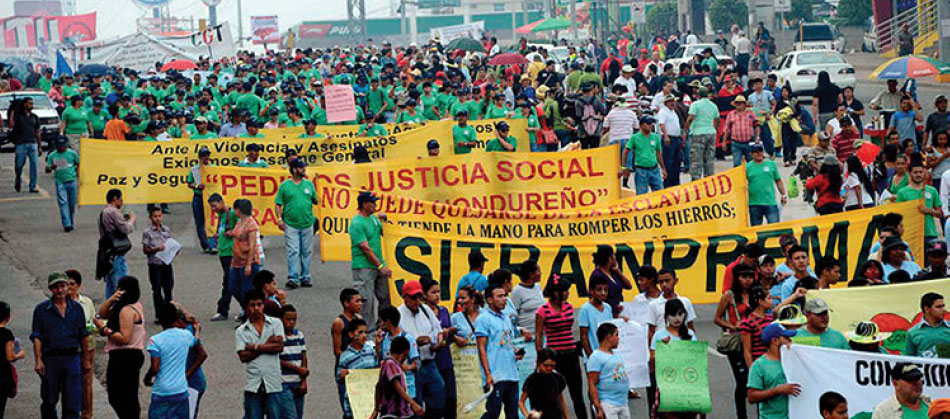
Jul 20, 2021
In Honduras, where union leaders are targeted with violence and even murdered for trying to form unions and improve workers’ lives, Darlin Oviedo, president of the apparel union SITRAJASPER (the Union of Workers of the Jasper Company), recognized the signs that he might be next.
In October, a motorcycle driver pulled alongside his motorcycle, staring at him with threatening glances, Oviedo told Solidarity Center, speaking through an interpreter. When he saw that the driver carried a high-powered weapon, he says he wove through traffic, trying to get away. The other driver followed him until Oviedo took cover at a shop. In the following months, Oviedo was followed two more times and, along with the employer’s attempts to undermine the maquila worker union he leads, Oviedo recognized he was not safe. He has since left his family for an undisclosed location.
“When people stand up to defend their rights and say there shouldn’t be any rights violations against workers, that’s when employers decide to mete out violence against union leaders like us,” Oviedo said. “I know that I lived through the first two attempts on my life but who’s to say there is not a third attempt coming at me.”
Oviedo says he and union general secretary, Selvin Peña, have been targeted since October, when workers rallied to demand the apparel factory bring back workers who wanted work after COVID-19 restrictions eased. Although the employer did call back the workers after the rally, Oviedo says the employer then began blaming all factory problems on the union, in what he says is retaliation for union success in improving worker rights on the job.
“Conditions were really difficult at the factory before the collective bargaining agreement,” says Oviedo. “But through the collective bargaining agreement, we won a really, really good contract, and that may be something the employer may not want to wholeheartedly support, so that is why they are going after the union.”
Workers Improve Job Safety with Solidarity
Forming a union at the Jasper garment factory was hard and took many years. Garment workers first created a union in 2006, but with workers facing constant employer harassment, including being fired for their participation, the union did not last. In 2016, 38 workers came together to rebuild the union and negotiate a collective bargaining agreement that covers some 2,440 workers.
Oviedo says among the many improvements, the contract restructured the occupational safety and health committee to focus on prevention, especially repetitive motion injuries that maquila workers frequently experience. The contract also ensures workers can speak up without retaliation when supervisors use abusive language, and it increased food and transport subsidies.
Oviedo took the lead in forming the new union. “When I first started at the factory, I noticed the production quota was so high, and demands so high for workers, I spoke up,” he says. “Because I spoke up about it, I was almost fired. Other workers felt the same. We started organizing quietly. They fired four of us and two of us won reinstatement.”
Challenging Anti-Union Violence
Oviedo has been active in the struggle to counteract anti-union violence since 2017, when he contacted Network Against Anti-Union Violence about physical assaults on two SITRAJASPER members and the murder of Roger Vásquez, a leader of another maquila union, SITRAGENESIS. The men were attacked as union activists participated in pro-democracy rallies in Choloma, in the Cortés department, after the presidential election.
He joined the Network’s national coordinating team and in May, the Network recognized him with an award for his union contributions and for his efforts to defend working people who have been victims of anti-union violence. Jorge Hernández at the Network Against Anti-Union Violence, honored Oviedo, and said Oviedo and his union sisters and brothers in SITRAJASPER, face “acts of intimidation and threats because of their struggle to build a more just society.”
In 2019, two union leaders in Honduras were murdered and dozens more physically attacked, threatened and harassed for their activism in advocating worker rights, according to the Network, which releases an annual report documenting harassment, retaliation and attacks against workers for their union leadership. (Read the 2020 report in Spanish.)
Despite all he is facing, Oviedo says worker victories give him hope. He cites an incident when the employer sent everyone home due to supply shortages forcing workers to use vacation time.
“We weren’t asking for vacation and that’s against the law to make us assume the cost of the business loss,” he said. “Because we were organized, we won back pay for some of the days we were home. That was a really inspiring moment for us—we saw that because we were organized we could win our rights.”
Holding Governments Accountable
Addressing anti-union violence means ensuring decent work and public safety, Oviedo says. “Economic inequality continues to widen for as long as these union campaigns are violently repressed, driving people to flee.”
The AFL-CIO is urging creation of a Central American regional migration framework that “centers on human rights, protects and empowers workers, safeguards the environment, and produces positive labor market outcomes for all working people.”
Further, the federation proposes aggressively enforcing labor standards under the U.S.-Central America Free Trade Agreement (CAFTA), and reopening CAFTA negotiations to improve and update its labor standards and enforcement mechanisms to align with the higher standard set under the U.S.-Mexico-Canada Trade Agreement.
“Right now we’re living through a moment of a lot of tension between workers and the company,” says Oviedo. “We must stand up to them because it’s our right. I have had to relocate to maintain my safety, but it is because it is our right to decent work.”
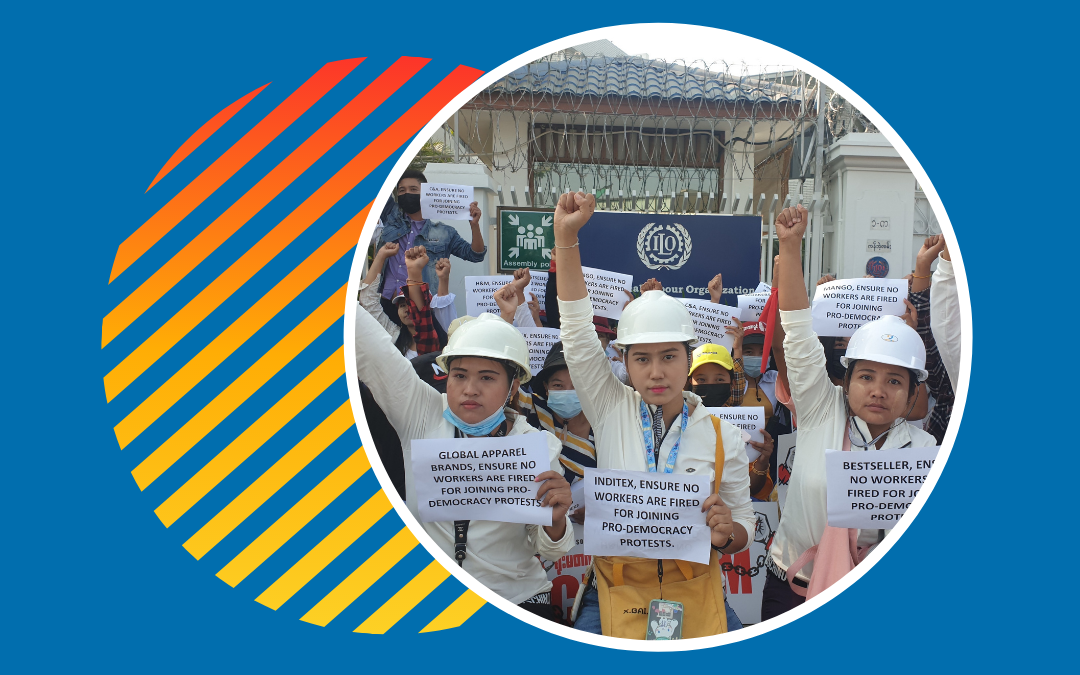
Jul 14, 2021
After the military overthrew Myanmar’s democratically elected government in February, the country’s garment workers, most of them young women, were the first to stand up to defend their right to a free and peaceful society. Since then, workers have led peaceful protests for a return to democracy—often met with violent repression, evictions, arrest warrants and prison.
Nearly 1,000 people have been killed and at least 5,000 arrested, most tortured in prison, forcing many workers and union leaders to flee. Because of their important role in standing for democracy, the government banned unions.
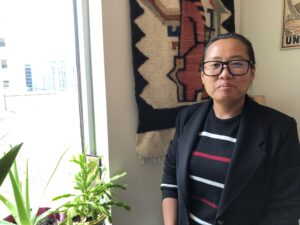
CTUM Assistant General Secretary Phyo Sandar Soe is standing with workers across Myanmar in a peaceful struggle for democracy. Credit: Solidarity Center/Tula Connell
In a special Solidarity Center summer podcast episode, host Shawna Bader-Blau, Solidarity Center executive director, talks with Phyo Sandar Soe, assistant general secretary of the Confederation of Trade Unions-Myanmar.
Speaking from a safe house, Sandar, a former garment worker, tells Bader-Blau that as multinationals begin to reopen in Myanmar, workers have no rights on the job without unions—including to be paid. The international community can truly help workers fighting for their rights by staying out of the country, she says. (Listen to the full interview.)
“If you invest in Myanmar, your investment money will go to the military regime,” Sandar says. “And then the military regime, with your money, they will keep controlling the country and they will buy guns and weapons, and then they will kill us.”
Like many union leaders, Sandar has her passport revoked to prevent them from leaving the country while they are being hunted by the regime. Despite the repression and personal danger, Sandar says when workers join together, they are strong.
“We are facing a bloody crackdown, but all people protect each other. We are finding solutions to fight back. That’s why I want to tell our brothers and sisters to endure this duration because we have very high motivation to fight back against the junta.”
Support Workers in Myanmar!
• Donate to a fund set up by the U.S.-based Asian Pacific American Labor Alliance. Your donation will go to those who have lost jobs and are struggling to survive because they stood up for a peaceful return to democracy. The link is available in the podcast notes for this episode.
• The International Trade Union Confederation is sponsoring a strike fund for workers in Myanmar.
Download Season One Episodes
The Solidarity Center Podcast, “Billions of Us, One Just Future,” highlights conversations with workers (and other smart people) worldwide shaping the workplace for the better.
Check out the full first season of The Solidarity Center Podcast and stay tuned for season two this fall!
This podcast was made possible by the Ford Foundation and the generous support of the American people through the U.S. Agency for International Development (USAID) under Cooperative Agreement No.AID-OAA-L-16-00001 and the opinions expressed herein are those of the participant(s) and do not necessarily reflect the views of USAID/USG.









